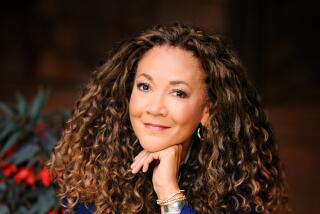Larry Elder’s Conservative Views
- Share via
The interview with Larry Elder (“Racism Has Almost No Effect on How a Person Succeeds or Fails,” by Michael La Mont, May 27) betrays the struggles minorities in America have endured. Has Elder selectively forgotten racism’s historically malicious role in keeping blacks, Mexican Americans and Asian Americans from fully participating in American society?
I thought the civil rights movement of the late 1960s was about liberating people of color from institutionalized systemic oppression and changing societal notions of inferiority based on skin color.
Elder says that affirmative action implies that something is “wrong” with certain minorities, that we’re somehow defective. What I want to know is how he came to that conclusion. What’s he trying to tell me, a young aspiring Chicana/Korean, and other young minorities who find flaws with society’s color-based distribution of opportunities?
I am proud to be a daughter of an immigrant, hard-working family. My individual efforts could not have been the sole reason for my success. I am a product of a dynamic combination of my family, communities, public schooling and efforts of leaders dedicated to a more equal and perfect America. I acknowledge that affirmative action may have played a role in my admission to Yale University, and I hope it continues to aid other deserving minorities in gaining access to valuable opportunities.
I just wish that leaders like Elder would recognize their successes as crucially linked to their broader communities and history.
MAUREEN GUADALUPE LIM
Los Angeles
*
Seldom have I read an uplifting article like the one on Larry Elder.
I am deeply touched by his desire to be near his parents before they got too old for him to appreciate them and his decision to return to L.A. to face an uncertain future just to be with them.
And he is very correct that the ignoramuses who practice racism are not worth the time one spends worrying about their actions. Black children have an extra hurdle to overcome. Leaders like Jesse Jackson and Maxine Waters feed them the dangerous notions that whites owe them and that they should expect handouts. This fact prevents many from really trying hard.
G. A. MENON
Beverly Hills
*
Elder contradicts his whole premise [that racism has little effect on a person’s success] by listing his father’s jobs: shoeshine boy, porter, hotel valet, janitor and cook. Those were menial jobs reserved for African Americans when Elder’s father was growing up. So while his father may have succeeded, the “how” of it was very much affected by racism.
In his opposition to public education, I’m wondering: Did Elder go to private schools and pay his own way through college and law school? If so, he may have a point. If not, then he, like Clarence Thomas, wants to avail himself of these opportunities, then shut the door behind him, a trait shared during slave days by overseers, many of whom were of African extraction.
ED COREY
Culver City
*
I was told by a former colleague that during one summer while he was working in Atlanta, an associate said that he came across an excellent resume but that they wouldn’t hire that applicant because he was black. This is in direct contrast to Larry Elder’s way of viewing this country’s attitude toward blacks.
There are white people in power who have racist views (which may not be overt) that do have a direct influence as to whether a black person succeeds or not.
Obviously Elder has not been reading the articles printed in The Times about the various cases of employment racism rampant in Los Angeles alone. Or maybe he is more naive than I give him credit for.
RAYMOND E. HARDY
Compton
*
One can certainly commend Larry Elder for his achievements, which I believe, in part, reflect his having the good fortune to have been raised by loving parents who early in his life instilled within him the values of hard work and belief in his own abilities. But his referring] to the Rev. Jesse Jackson, Rep. Maxine Waters, Benjamin Hooks and the Rev. Benjamin Chavis as “so-called black leaders” is not only inaccurate but dishonest. These individuals all have long records of activism and have valid organizational and community support.
Elder, like most black conservatives, is angry and frustrated because they are virtually isolated, with little or no support in the black community. To ignore the fact that a large number of African American citizens not endowed with the same childhood advantages as Elder have in the past--and continue to--benefit from publicly assisted social and educational programs is not only shortsighted but morally insensitive.
WALLACE CHEATHAM
Huntington Beach
More to Read
Sign up for our Book Club newsletter
Get the latest news, events and more from the Los Angeles Times Book Club, and help us get L.A. reading and talking.
You may occasionally receive promotional content from the Los Angeles Times.








